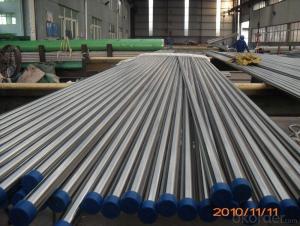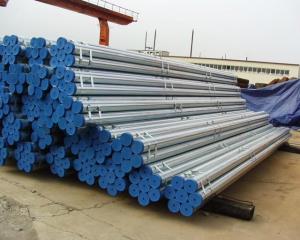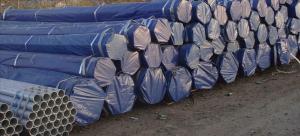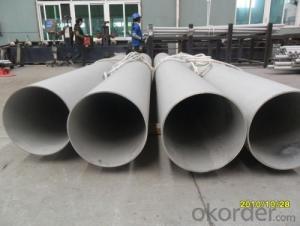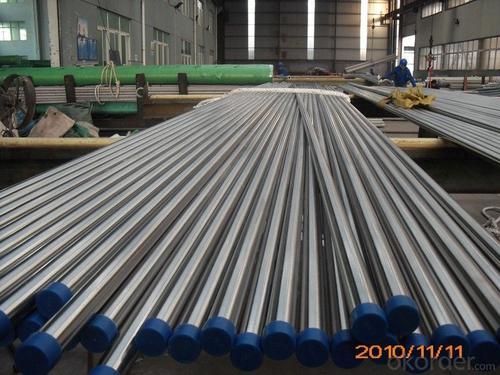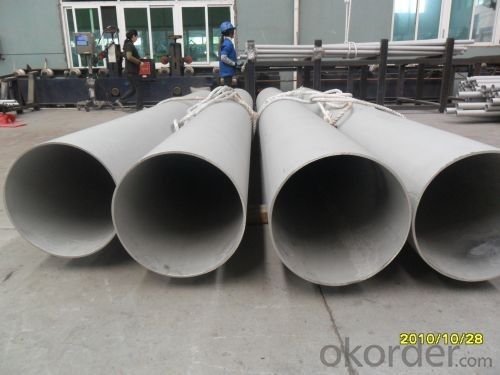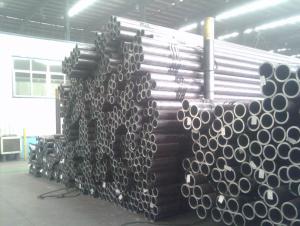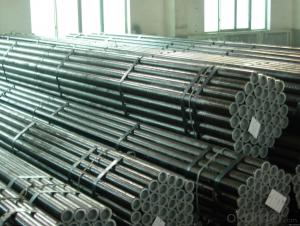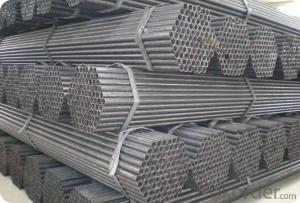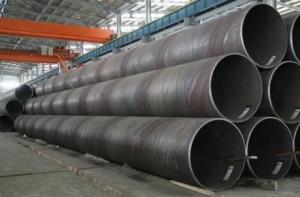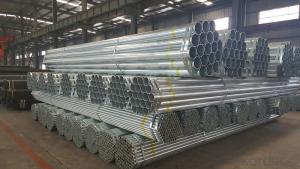Tube Welded Steel Pipe API SPEC 5CT Steel Pipe API SPEC 5CT
- Loading Port:
- Shanghai
- Payment Terms:
- TT or LC
- Min Order Qty:
- 25 kg
- Supply Capability:
- 5000 kg/month
OKorder Service Pledge
OKorder Financial Service
You Might Also Like
1、Structure of Welded Steel Pipe API SPEC 5CT:
Welded Steel Pipe is to be used for conveying gas, water, and petroleum foroil and natural gas industries. And used for structural steel pies purpose. As the manufacturing process does not include any welding, seamless pipes are perceived to be stronger and more reliable. Historically seamless pipe was regarded as withstanding pressure better than other types, and was often more easily available than welded pipe.
2、Main Features of Welded Steel Pipe API SPEC 5CT::
• High manufacturing accuracy
• High strength
• Small inertia resistance
• Strong heat dissipation ability
• Good visual effect
• Reasonable price
3、Welded Steel Pipe API SPEC 5CT: Specification:
Standard | GB, DIN, ASTM ASTM A106-2006, ASTM A53-2007 |
Grade | 10#-45#, 16Mn 10#, 20#, 45#, 16Mn |
Thickness | 8 - 33 mm |
Section Shape | Round |
Outer Diameter | 133 - 219 mm |
Place of Origin | Shandong, China (Mainland) |
Secondary Or Not | Non-secondary |
Application | Hydraulic Pipe |
Technique | Cold Drawn |
Certification | API |
Surface Treatment | factory state or painted black |
Special Pipe | API Pipe |
Alloy Or Not | Non-alloy |
Length | 5-12M |
Outer Diameter | 21.3-610mm |
Grade | 20#, 45#, Q345, API J55, API K55, API L80, API N80, API P110, A53B |
Standard | ASME, ASTM |
1) Material:20#(ASTM A 106/A53 GRB.API5LGRB,GB),45#,16Mn,10#.
2) Specification range:OD:21.3-610mm,WT:6-70mm,length:6-12m or according to the requirement of clients.
3) Excutive standards:GB,ASME API5L.ASTM A 106/A53,Despite of the above standards,we can also supply seamless steel pipe with standard of DIN,JIS,and so on,and also develop new products according to the requirements of our clients!
4) Surface:black lacquered,varnish coating or galvanized.
5) Ends:Beveled or square cut,plastic capped,painted.
6) Packing:bundles wrapped with strong steel strip,seaworthy packing.
4、Packaging & Delivery
Packaging Details: | seaworthy package,bundles wrapped with strong steel strip |
Delivery Detail: | 15-30days after received 30%TT |
5、FAQ of Welded Steel Pipe API SPEC 5CT:
①How is the quality of your products?
Our products are manufactured strictly according to national and internaional standard, and we take a test
on every pipe before delivered out. If you want see our quality certifications and all kinds of testing report, please just ask us for it.
Guaranteed: If products’ quality don’t accord to discription as we give or the promise before you place order, we promise 100% refund.
②How about price?
Yes, we are factory and be able to give you lowest price below market one, and we have a policy that “ for saving time and absolutely honest business attitude, we quote as lowest as possible for any customer, and discount can be given according to quantity”,if you like bargain and factory price is not low enough as you think, just don’t waste your time.Please trust the quotation we would give you, it is professional one.
6、 Welded Steel Pipe API SPEC 5CT: Images:
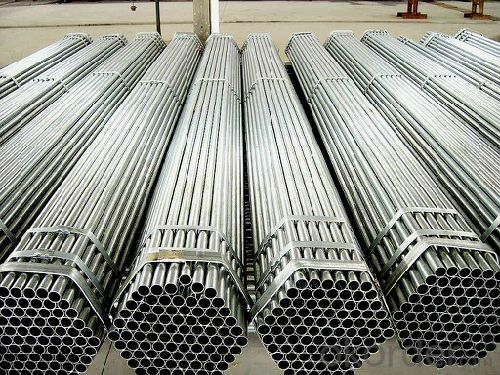
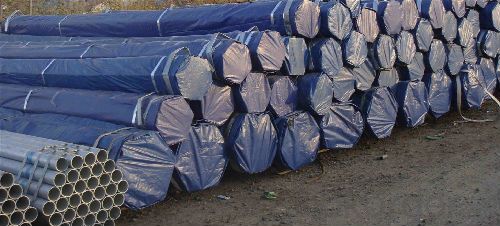
- Q: How do you prevent freezing in steel pipes during cold weather?
- One effective way to prevent freezing in steel pipes during cold weather is to insulate the pipes. This can be done by applying foam insulation sleeves or wraps around the pipes. Additionally, ensuring that the pipes are properly sealed and any gaps or cracks are sealed can help prevent cold air from reaching the pipes. It is also important to keep the pipes warm by maintaining a consistent temperature in the surrounding area. This can be achieved by using a space heater or by allowing warm air to circulate around the pipes.
- Q: What are the different testing methods for steel pipes?
- Some of the different testing methods for steel pipes include non-destructive testing methods such as ultrasonic testing, magnetic particle testing, and radiographic testing. These methods are used to detect any defects or inconsistencies in the pipe's structure or material without causing any damage. Other testing methods include hydrostatic testing, which involves pressurizing the pipe with water to check for leaks or weaknesses, and mechanical testing, which measures the pipe's strength and durability through tensile, hardness, and impact tests.
- Q: What is the difference between steel pipes and plastic pipes?
- Steel pipes are made from a strong and durable metal, while plastic pipes are made from synthetic materials like PVC or polyethylene. Steel pipes are typically used for high-pressure applications and in areas where strength and durability are key factors. On the other hand, plastic pipes are more lightweight, corrosion-resistant, and easier to install. They are commonly used for low-pressure applications and in areas where chemical resistance is important.
- Q: How are steel pipes protected against chemical corrosion?
- Steel pipes are protected against chemical corrosion through various methods such as applying protective coatings, using corrosion-resistant alloys, and implementing cathodic protection systems.
- Q: Can steel pipes be used for piling?
- Yes, steel pipes can be used for piling. Steel pipes are often used as piles in construction projects due to their strength, durability, and ability to withstand heavy loads. They provide strong support for structures and are commonly used in foundation systems for buildings, bridges, and other infrastructure.
- Q: What's the difference between seamless steel pipe and welded pipe?
- Seamless steel pipe having a hollow cross section, used as a conduit for conveying fluids, such as pipelines for transporting petroleum, natural gas, gas, water, and certain solid materials. Compared with the solid steel such as round steel, the steel tube is lighter in strength and is an economical section steel when the flexural strength and torsion strength are the same.Widely used in the manufacture of structural parts and mechanical parts, such as the oil pipe, automobile transmission shaft, the bicycle frame and steel construction with scaffold with steel pipe manufacturing circular parts, can improve the utilization rate of materials, simplify the manufacturing process, material saving and working hours, has been widely used to manufacture steel tube.
- Q: What place must use galvanized steel pipe to make lighting line?
- Galvanized pipe for pipeline laying construction and transformation of lighting, power, telephone, fire protection system in the engineering (made of galvanized steel), for laying, laying can be laid in the dark, the wall can also be installed on the ceiling.
- Q: What are the different types of coatings used for internal lining of steel pipes?
- There are several types of coatings used for the internal lining of steel pipes, including epoxy coatings, polyurethane coatings, cement mortar coatings, and thermoplastic coatings. These coatings help to protect the steel pipes from corrosion, increase their lifespan, and improve the flow of fluids through the pipes.
- Q: What are the common maintenance practices for steel pipes?
- Common maintenance practices for steel pipes include regular inspections, cleaning, and corrosion prevention. Regular inspections are crucial to identify any signs of damage or wear. This can involve visual inspections, as well as non-destructive testing methods such as ultrasonic testing or magnetic particle inspection. Inspections should be carried out on a scheduled basis to ensure any issues are detected early on and can be addressed promptly. Cleaning is another important maintenance practice for steel pipes. This involves removing any dirt, debris, or scale that may accumulate both on the inside and outside of the pipes. Regular cleaning helps to prevent blockages, improve flow efficiency, and reduce the risk of corrosion. Corrosion prevention is a key aspect of maintaining steel pipes. Various methods can be employed to protect the pipes from corrosion, such as applying protective coatings, using cathodic protection systems, or implementing corrosion inhibitors. These measures help to extend the lifespan of the pipes and ensure their structural integrity over time. Other maintenance practices may include repairing or replacing damaged sections of the pipes, maintaining proper insulation to prevent heat loss or gain, and monitoring the pipes for any signs of leakage or pressure drops. Overall, regular inspections, cleaning, and corrosion prevention are essential maintenance practices for steel pipes. By implementing these practices, the lifespan of the pipes can be prolonged, and potential issues can be identified and addressed before they cause significant damage or disruptions.
- Q: What is the difference between steel pipes and ductile iron pipes?
- Steel pipes and ductile iron pipes are both commonly used for conveying fluids and gases, but they have notable differences. The main distinction lies in their composition and properties. Steel pipes are made of an alloy of iron and carbon, providing them with high strength and durability. On the other hand, ductile iron pipes are composed of iron, carbon, and small amounts of other elements such as silicon and manganese, which make them more flexible and resistant to bending. Ductile iron pipes also have superior corrosion resistance compared to steel pipes. Overall, steel pipes are preferred for applications requiring higher strength and pressure resistance, while ductile iron pipes are often chosen for their flexibility and corrosion resistance.
Send your message to us
Tube Welded Steel Pipe API SPEC 5CT Steel Pipe API SPEC 5CT
- Loading Port:
- Shanghai
- Payment Terms:
- TT or LC
- Min Order Qty:
- 25 kg
- Supply Capability:
- 5000 kg/month
OKorder Service Pledge
OKorder Financial Service
Similar products
Hot products
Hot Searches
Related keywords
